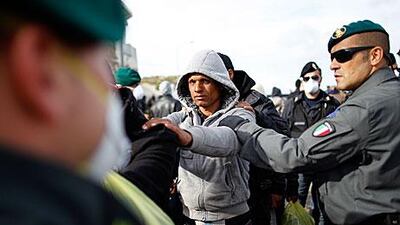AMSTERDAM // Two of the European Union's most visible achievements - a shared currency and a zone allowing free movement among 25 countries - are facing serious challenges almost simultaneously.
While European leaders were still debating a way to bail out Greece and save the euro, the European parliament met yesterday to put pressure on member states to allow relative EU-newcomers Bulgaria and Romania to join the Schengen zone.
Schengen is a sector encompassing 25 countries that have lifted border controls and have a joint policy on external borders and entry. Made up mainly of EU countries plus Iceland and Switzerland, it excludes EU members Great Britain and Ireland.
Both Bulgaria and Romania have met the criteria set out by the European Commission to join Schengen but face objections from the Netherlands and Finland who claim that they were rife with corruption.
The row escalated earlier this month into what has been dubbed "the tulip wars" when Romania briefly stopped lorries carrying the famous Dutch export product at its borders. The Dutch and Finnish objection came hot on the heels of a near-miss for Schengen. Denmark was about to reimpose border controls but that was headed off by the victory of the Social Democrats in elections last month.
An earlier challenge to Schengen occurred during the Arab Spring when France and Italy called for the right to reimpose some internal border controls to intercept refugees from North Africa. Europe responded by strengthening its external borders and boosting the agency that helps to patrol them, Frontex.
But to forestall future internal disruptions, the European Commission last month effectively proposed to make it even harder for countries to re-establish border controls unilaterally. The move was not what France and Italy had in mind, nor did it go down well with Spain and Germany, and there was sharp disagreement about how to solve the issue.
Whether it was corruption and crime or immigration, many European politicians and analysts said that the stated reasons for the challenges to Schengen were merely pretexts for right-wing parties to promote their nationalist agendas.
"We believe immigration should be an issue but it depends on how you deal with it. You should not deal with it in a populist way, you should deal with it in a responsible way," said Antoine Ripoll, a spokesman for the European People's Party (EPP), the centre-right bloc in the European parliament.
The EPP's members often compete for votes with the extreme right-wing parties in their own countries. Analysts said that French president, Nicolas Sarkozy, and Italy's prime minister, Silvio Berlusconi, have taken a hard line on immigration because of the pressure put on them by far-right parties. The same was true of some other countries with regard to the Greek bailout.
Mr Ripoll deplored this trend because it threatened to make Europe even less governable at a time when it needed to be united. "All European solutions are good, we do not favour unilateral decisions. It is true for immigration as it is for the economy."
One of the right-wing parties that has challenged the Schengen Agreement is Denmark's anti-immigrant Danish People's Party. From 2001 until the election defeat last month, it had propped up a centre-right minority government and succeeded in tightening Denmark's immigration rules. It had also pushed through some new border controls, mainly along the German frontier, ostensibly to counter crime in the border area.
One of its European parliament members, and spokesman on Schengen, Morten Messerschmidt, claimed that the Danish population was broadly supportive of tighter immigration rules and that his opponents were aware of this.
"Some of the core issues of the former administration's migration law have been copied and adopted by the Socialists. They have claimed that they would continue to have the same migration policy and now we see that this is not actually true," said Mr Messerschmidt.
One of the first acts of the new Social Democrat dominated government in Denmark was to scrap the plans for new border controls. Yves Pascouau, an expert on migration and Schengen at the European Policy Centre in Brussels, warned that the prominence of the migration debate in elections could lead to greater volatility on the issue in Europe over the next few years.
"The situation as it is now, could be very different in a few months time," he said, pointing at possible changes of government in countries such as Spain and Italy.
Despite the electoral stakes, he was sure that populations would continue to back Schengen. "I would be very surprised to see other governments do as the Danes wanted to do and I would be surprised if the populations would agree to that. People don't want to queue for hours at the Franco-German borders or have lorry drivers wait in kilometres-long lines."
It seems likely that external checks will be boosted, as it was the one thing that everybody could agree on. The budget of the EU's Frontex border agency has increased twenty fold since 2004 and reached 86 million euros (Dh434m) this year. More than €40m of this were voted through last month as an emergency to "manage migration and refugee flows" as a result of the Arab Spring.
But this solution also prompts controversy. Human Rights Watch in a report last month slammed Frontex for "exposing migrants to inhuman and degrading conditions". The European Commission promised better safeguards. But at the same time it announced yet another expansion of the responsibilities of Frontex.

